A new documentary attempting to put both a personal and a political perspective of Omaha on screen is the aptly titled My Omaha, directed by Nick Beaulieu, which embarks on its director’s dueling journey to balance the tense relationship he has with his terminally ill father, a big supporter of Donald Trump with his exposure to the legacy of Malcom X and activist Leo Louis II, each representing radically different worldviews in a polarized climate. In doing so, Beaulieu explores his Omaha, but also Omaha as a microcosm of a country that is full of contradictions so deep that they may never be reconciled. And, if one confronts that prospect, then what?
My Omaha premiered at the Slamdance Film Festival and is currently making its way around the country, starting its journey toward readily available viewing. Watch out for it as it likely comes to your neck of the woods sometime soon. Find showtimes and events at myomahafilm.com.
Tom Knoblauch: As My Omaha has started to get out into the world, how has it been for you to be watching it with people who don't have maybe any tangible connection to the city itself?
Nick Beaulieu: It's actually been a great litmus test because my hope was that the film would have a kind of universal appeal. I wanted people to resonate with the story, no matter where they come from, because I think it's a very American story. And I also think it's helpful when people don't know anything about Omaha when they're coming into it. So, it's actually been great for us, getting feedback in that way.
At the same time, I can't wait for the Omaha premiere just because I know that there's so many aspects of the movie and the story that are going to hit differently for people in Omaha just because, you know, I'm from the city. I know it well. I made certain choices based on that. So, I’m very much looking forward to that feedback and that response.
When you say you got some feedback from people who don't have an Omaha connection, what are the assumptions about Omaha that maybe are subverted by My Omaha?
That's a good question. It's very much a city that has an urban side to it. I think a lot of people from outside of Omaha see or perceive it as a more rural place. The diversity within Omaha, for sure. It’s been really helpful rolling out the film with Leo Louis, who’s in the movie—and the film has only premiered once so far at Slamdance in Los Angeles. And Leo got to come out with me, which was really cool.
So, those are just a couple ways, but a lot of it is people seeing this relationship between me and my dad and being like, “That’s how me and my dad are.” So, it’s actually also showing people what’s happening in Omaha is happening all over the country.
Documentary filmmaking: how did that end up on your radar? I notice that there's the initial connection between your dad filming a lot of things as home movies and your work here. Does that lead to your interest in cameras and using them?
It's funny. I think that ended up being a post-discovery once I really got into becoming a filmmaker. My career started as a journalist, which is kind of reflected in the backstory of this film. I was a print journalist. And the reality was that I saw the writing on the wall with where the industry was going, and what I really loved telling were in-depth feature stories that had arcs and emotions and that took a lot of time to make and I realized that was the kind of storytelling I could do with film. So I made a pivot during university, then did a couple of internships, and then when I got back to Omaha, I started making this film. And eight, nine years later, this is what I have.
Were there certain documentaries that you saw that gave you either permission or a sense of the rhythm you were after—the grammar that you felt like you could operate in with the skills that you’d already developed?
I was very influenced when I discovered Ross McElwee's work. I make documentary films for a living, and I also like to film everyday life, including my own life. I've become kind of obsessed with making these autobiographical home movies. He's considered one of the great personal filmmakers. And my film really didn't actually become personal until several years of making it, so discovering his work and learning some of how he operated was huge as far as generating ideas on how to tell a personal narrative.
Then on the other hand, I was hugely influenced by O.J.: Made in America, the reality of Black America and white America two totally separate worlds, and the timing of that documentary—coming out right before the Trump presidency . . . I was particularly moved by how that film interwove two stories: the story of O.J. Simpson and also then the story of race in America. I feel like My Omaha is also kind of the intertwining of two different stories.
I was thinking as I was watching My Omaha about my own personal formative sense of what a documentary is. We've talked about on this show—we did an episode where we tracked the blockbuster documentary in the early 2000s, where you've got Michael Moore and Fahrenheit 9/11 really is this popular movie in a way that documentaries rarely are, and maybe increasingly are not, and then that's given way now to Matt Walsh is trying to do fill that space because Michael Moore is not as popular as he once was. Documentaries seem to exist in this precarious state—you talked about print journalism as something precarious—does the documentary seem like it has more of a vitality or sort of cultural potential right now than some of the doomsayers like, uh, myself on a previous episode are saying?
I do have a little bit of a mixed feeling about optimism versus pessimism for documentaries. From an industry perspective, it is in a kind of political bubble when it comes to connecting with people from different political backgrounds. Also, what you're seeing is so many more people are gravitating towards nonfiction video content like on YouTube, which is sort of replacing what documentaries used to be for people. I look at people now consider like Andrew Callaghan to kind of be like the millennial Michael Moore of the moment. And he very much came up through the YouTube ranks.
So, even as a filmmaker myself, as I think about my future projects, I've actually been thinking a lot about platform and a lot about audience because the old model of making a film and trying to get it out through the traditional distribution models . . . it's not very effective actually at reaching a very big audience anymore. And it's not very effective at reaching a diverse audience anymore.
Let's unpack that a little bit. Why is it that the distribution channels don't reach a wide or diverse audience for documentaries—or maybe more broadly than that?
I think it's similar to how some of the legacy media only caters to a certain demographic—the kind of like more educated, elite groups of people. You think about some of the long form journalism and magazines or the traditional legacy TV shows that used to have a more universal tune-in. Now, more people have found what appeals to them on the internet because it's more targeted. It's a little bit more niche.
And so it's really split off folks. And I think that the same thing has happened to documentary, in a way. You also can't really talk about it without mentioning the state of funding, as well. That's becoming a little bit more problematic week-by-week amidst the current political situation. So, financially, it's harder to get your film out as well. I mean, you can look up the stats and see. the documentaries that get into Sundance? A very small percentage of them end up actually getting distribution deals afterwards. There's so many different economic factors at play, but I think a lot of it is is about the audience.
So what made you commit to a feature documentary instead of something that would be on YouTube or TikTok or some new platform?
It's a good question. I suppose because I fell in love with feature films, it's just kind of what I aspired to do. I think it's a really great format for telling a story still—something between 75 and 90 minutes. And I felt like really what dictated my decision-making was actually what we had to to tell from a story perspective. I worked with a lot of editors that I was grateful were capable of being very honest with me, and there were times where we considered making it a short film. There were times where we tossed around, “Could this be a series if we expanded certain areas?”
But, ultimately, we felt like the story itself dictated that the feature length made sense. And I think that that's also reflected in the pace of the film and the story. After covering something for eight years, it felt like the right amount of time to be representative.
When you started it, you didn't anticipate that it would take eight years, did you?
Oh, no, not at all. I saw it as a two- or three-year thing. It kept getting extended from a timeline perspective. There was a point in 2020—right before the pandemic where I was working full time and I left my job to fully commit myself to finishing the movie. And I basically gave myself that year, because I didn't have that much money to do it. But five years later, it still took a while to get the rest of the funding and to actually end up filming a lot more and then to do all the editing that was necessary.
So, honestly, so much of it was overcoming this immense place of kind of naïveté that I was operating from when it came to how challenging it is to make a feature film.
As far as the initial iteration of it, you seem to situate 2016 as kind of a seismic shift in the culture, maybe because of real tangible changes, but also maybe just because of perspective shifts where it was once maybe easier to ignore certain truths that are harder to ignore post-2016. Was that the starting place of what you wanted in the initial iteration that, as you say, was not all that personal at the beginning?
The first version was very much looking at it through an Omaha lens, which was these two disparities—or I guess one disparity of two sides—which is that I saw Omaha's black community really going through a difficult time when it came to violence and the education statistics that were really bad. Yet, at the same time, I saw so many stories talking about how Omaha was touted as one of the greatest places to raise a family and had super low unemployment and strong middle class. And I just wanted to understand how these two things could exist in the same city, where if you're really paying attention in one corner of town, you were not going ton pick up what the other corner of town was talking about.
So, it very much actually started from a very, very local perspective. And then I think when I saw that there was very much a national thing happening, that's where I realized, “Okay, I think that this can actually resonate beyond just Omaha for people as we saw so much change throughout the Trump years.”
What was it that put the particular divide of Omaha on your radar initially as something that was worth exploring in a documentary?
It's a good question. I grew up in West Omaha and amidst the segregation that I still saw existing, so there was a desire to understand that more. And then I was also just really struck by the amount of gun violence that was happening and how there was just a sort of apathy about it. I found it extremely ironic that the branding for the city were catchphrases “We Don't Coast” and “One Omaha” or “One Community”—things like that—and yet there's this huge disconnect over the issues and over how people prioritize the problems and talk about the problems in the city.
And then I think once I got going, there was a ton of education that I went through and also a humbling process as well of understanding the gravity of the issues and the nuance of the issues as well.
In that initial iteration, were you going to be in it?
You know, I think originally the idea was to not to really not be that present at all. I mean, we were filming a lot of interviews early on where I was not on camera, where we weren't going to use my questions. A big turning point, though, was when I was really building my relationship with Leo. He and I were just having these really interesting and powerful conversations off camera all the time about what this movie is and what this movie could be. And Leo was really challenging me to think very critically about that because he didn't want to see like another white filmmaker make a film about race that just comes in and comes out of the community.
If he was going to be a part of something, he wanted to be a part of something he felt could make a difference and that was properly representative. And so I felt I should embrace my perspective and just be honest about that—the good and the bad when it comes to my role in all this. And I think it ends up making the whole film just a much more honest and authentic and vulnerable story as a result.
Can a documentary make a big cultural difference? Or what does that mean for it to make a difference?
I think it's case by case, you know? Some films have had the power to enact political and legal changes and shift culture. There was a film that came out last year that was nominated for an Oscar, Black Box Diaries, that really made waves in Japan. I was incredibly moved by that movie. It was also a personal story. There's a spectrum where that can happen. I also think that just great documentaries in many cases are not all that dissimilar from narrative films in the sense that they have the potential to create tremendous amount of emotional resonance for people and make them think in new ways about things.
That's what draws me to the art form. I'm not really that interested in being in the business of educating people. I think that the visual tool of film is not at it’s best when it’s simply giving you facts. It's at its best when it is giving you a story that can move you. If a film can do that, it's successful. It’s the case for narrative. It's the case for documentary. There’s a spectrum.
I saw recently that Errol Morris said that Harvey Weinstein called him and asked if he could do another Thin Blue Line about him and maybe get him out of prison. So I guess if Harvey Weinstein thinks that a doc could still do that, we maybe should be less cynical about this idea that art is kind of existing in some digital void. And, you know, who knows what a movie can accomplish?
I am recurrently moved by the power that just nonfiction just storytelling in general can have when it comes to change. I have listened to extremely low budget podcasts that have led to the exoneration of people that were falsely incarcerated. People have never had more tools to make nonfiction stories, whether it's films or whether it's podcasts. But I think also it's never been actually harder to get a mass audience to rally around a movie or a documentary because there are so many different silos right now. The future is a little bit murky.
That there's a lot of texture that the movie does this great job of pointing out that when you think about these big problems, these big changes, that correlate to local changes and that correlate as well to very personal challenges along the way. And so the links between questions like “Can I change the culture?,” “Can I change the society?,” and “Can I change this neighborhood?” are all paralleled in ways that are devastating when you think about the more localized: “Can I even get someone in my own family to think about something a different way?”
“How do you get your dad to think somewhat differently about something?” is this incredibly relatable conflict, but there's not a lot of art that grapples with it in the way that you do. And so how did the decision—or the realization that your movie could encompass this incredibly personal relationship with your dad as a centerpiece—come into the process?
The impetus for that was realizing that it is weird that I'm having trouble talking about this movie I'm making at home without it being a source of conflict. So when I started to think about, “Okay, why is that?” It made me realize that that in and of itself is part of the story—this idea of not being able to talk about these issues that are divisive, that are polarizing, that are controversial for some people. Where I was coming from as a filmmaker and as a concerned citizen/activist kind of minded person was like: I wanted to change Omaha, I wanted to change the city.
And you realize how, when you're young, you have those kinds of aspirations and then you realize how difficult it is to make that kind of change. And I think you also learn how realistic or not realistic it can be to change anyone in general—and that really the most impact you can make is the change you make with within yourself. And then how that actually has a trickle down effect on people, and I even think that happened in my story, which was that I changed. I think I became different in the way that I interacted with my dad in a way that was beneficial and more healthy and hopefully a good example for people to show what's possible when it comes to just trying to make a difference in such a divided environment.
Was it daunting to make that decision to be on camera in that naked, emotional way with your dad, having these difficult conversations?
In a way, doing it on camera and doing it through the guise of film made it easier to talk about things and ask questions I don't think I would have been able to do without it, because you create this purpose for it, whereas I don't think we would have covered the scope of subjects or we would have gone as deep naturally had we not had the excuse for it. I got very lucky that my dad was so comfortable with just being himself on camera, so willing to talk about such a wide range scope of issues. I can sense something in me when I'm filming with people that, when the camera is rolling, I do seem to find courage I don't have without it as a way to kind of just go deeper. And maybe it's just a bit of pressure—or maybe it's just like, “Okay, this is showtime,” you know? I actually didn't find it to be that much pressure. I think sometimes afterwards, it was actually kind of like: you would turn the cameras off and you would have to break down what had happened, decompress from it, because it’s very much an in-the-moment, very present type of thing.
Did you know you had that kind of on-camera courage you could switch into before this project or did you find it in the making?
I think I found it in the making of it. And it happened through repetition. I think that the interviews got better. A lot of things were going through my head while I was making this because it was so low budget and so DIY. I mean, I try to reveal a lot of that in the film, but, to give you perspective, I would put two cameras on a tripod frame—a wide shot frame, a closeup shot—I would hit play on both of them, make sure they were in focus, and then go sit down and do an interview. And there would be no one behind the camera. I knew in my head that I had about 30 minutes of runtime before I needed to go and check them, make sure that they were on or that I needed to hit on again.
So, I guess I got very good at juggling between being a director and being a subject in real time. And once you go through a lot of those sessions, you get comfortable with it and it can become more natural.
I don't know how much you can be aware of it exactly, because, if I'm filming a conversation I'm having with someone I'm close with, there's an intensity that I feel that I don't know whether is translated to the camera necessarily. But you and your dad also are good screen presences because your eyes are very expressive. That adds to this tension of what's said, what's not said, and what's being thought about. Was that something that was something that you were aware of as you were looking at your dad, asking these questions, having these conversations? How did you navigate knowing that it would be something that is engaging to watch outside of just your own personal baggage?
What you hope for when you do some of these conversations is that you kind of get lost in it and that you forget that it actually is for a film and that you're just having a dialogue. And I think that it was all of those moments are really what ultimately makes the cut. Many of the interviews that we did were like two hour interviews or three hour interviews. And there's maybe like three or four minutes taken from each of them. And it's usually the most raw, heartfelt, intense stuff. So, I was aware that, in most interviews, we were able to get to like a really honest place that I was satisfied with. And sometimes I would keep things going until we reached it.
Or, in other cases, honestly, what would sometimes happen is we would actually get there very early and then I would probably overdo it and talk way longer than we actually needed to, you know? And a lot of that comes from experience as well. I think many times I left one of these conversations thinking, “Okay, there was something there that we can use as a building block.”
Well, the central conflict, of course, is the political divide between you and your dad. You describe the basic sort of situation as you both were living in separate realities, but then trying to find some kind of common ground or understand each other or maybe move each other one way or the other. Why do you think your dad agreed to do this? What did he help to get out of it?
His motivation was very much that he was still driven to change my mind and change my perspective and to prove to me that he was right. Also, I think he wanted to help me, and he wanted to be a part of this film. What I sold him on was that this was going to be a way for us to document a very relatable story in America that could help other people. And it would also be a way for us to reconnect during this really difficult time, which was him going through cancer treatment, reckoning with such a grave diagnosis.
So, my dad, I think, had multiple motivations to draw from. He also appreciated just the documentation of things. As, you referenced earlier, he was a big home movie videotaper. I was also filming so many family functions like fishing trips and parties and so much that actually doesn't make the cut, but I built a presence where my camera was around all the time. And so I there were a lot of reasons that compelled him to want to do this.
Did he get you to think differently about any of the issues?
The issues themselves? No. Not really, to be honest. But what he did do was he taught me and allowed me to find a place of new empathy for people that have a totally different perspective than I do when it comes to the issues. And that came from trying to break it down with him and understand, from my asking, “How does this make you feel that we’re like this?” And when he was able to tell me, from the heart, how much it hurt him that we were so different and that he felt it was a betrayal of his trust in a way—that he didn’t think I found him intelligent—I think that I was able to talk to him with my eyes open to where he was coming from in a way that generated so much more empathy and understanding for why this was so important to him.
So, to use your phrasing of this idea of living in separate realities, do you feel like you were able to get to the same reality, even if not necessarily agreeing or seeing things the same way, but to understand enough that it's not literally feeling like you live on a different planet anymore?
I do think that we transcended the political stereotypes that we had for each other, in a way. To a point where we were able to actually just exist as a father and a son—as two humans—which sounds, on one level, extremely elementary, but which is a big deal today. If you took two people from the extreme opposites of a political side and tried to get them to understand each other and separate the politics, it's not that easy. So, we did get to that place where I wasn’t so fixated on my dad’s political identity and was able to see him as a human, a complex human. It was successful in that way, for sure.
There are a lot of people who I think are happy to accept the culture—the politics, the religion, the whatever-it-might-be—that their parents give them It's sort of like, “All right, I'm happy to just embrace whatever it is that I'm born into.” And some people rebel. Some people find that moment of disillusionment with it. So, for you, what was the distinction between, as a kid, getting along, agreeing with things, and the start of the divide that led to living in different realities?
I totally get what you're saying. I thought a lot about that as I have reflected on my own path of creating my, my own political identity. Where the divergence happened was during college and also just existing as a journalist and as someone who is naturally curious. I just have a tendency to question everything and to kind of interrogate everything. I grew up in a conservative background, where things were just presented as they were without much of a nuance to them. And then I think I was really driven to find the nuance in that.
So, college was very much a moment for that. I had a lot of opportunities, actually, spending some time outside of Omaha that I think played a role, too. I had an internship in Los Angeles on a film crew for a Korean documentary, where most of the students were from Korea. I was one of the only American students, and it was the first time being away from home for so long and also having such a multicultural experience—that was super eyeopening. I look back at that experience as one that really moved the needle for me. And I think engaging with lots of films and books and stories in my young adult life, discovering artists that I just felt so connected to also helped. It's hard to pinpoint one thing. It was really a slow culmination of changes over a long period of time.
I mean, essentially though, it's getting out of your comfort zone, right? And then your comfort zone expands and moves and then your perspective shifts, right?
Yeah, I do think so. Although, in many ways, it happened so naturally. I didn't feel like it was hard coming to where I am now. It just kind of happened. What's harder is actually reckoning with where you came from and accepting it and not criticizing it or putting it down, actually having some respect for it—both in the past and also for the people that you love who still come from that place. That, in my opinion, is harder.
One of the stereotypes of Omaha, and certainly it’s true of people I know or am related to ha have lived in West Omaha their whole lives, is that there are certain streets they won’t go past. They’ll ignore half, two-thirds of thirds of the city. They’ve got a bubble that they’re happy to live in. And that doesn’t necessarily come from a place of any kind of active malice, and yet it becomes emblematic of these long-existing systemic problems.
Yeah.
I talked to Jean Stothert last time she was running for reelection, and I was asking her, basically, “What is your answer to this idea of a divided Omaha and how it might be less divided in the future?” And she pushed back really hard, basically saying that it was ridiculous that I’d say the city is divided at all. And I wasn’t prepared for that answer from the mayor who has been mayor for a while, who wants to be mayor for a while still. Does it surprise you that even the mayor would have that kind of a reaction to that idea?
No, sadly, that doesn't surprise me. I mean, I would question the authenticity of that answer, to be honest, because how can you spend significant time in different parts of the city and not see that there is still a divide that exists? It's come a long way in even just 10 years, I think, from what I've witnessed. But I do think that people are certainly still in their bubbles from all parts of the community. You can be in the West Omaha bubble. You can also be a North Omaha resident and be in your own completely different kind of bubble. So, as far as what you were mentioning earlier about growing up in West Omaha and this idea of how you perceive other parts of the city, there's that scene in My Omaha where I referenced driving into North Omaha at night when I was younger—in high school—and that was a story I felt was really important to tell, to just be honest about where I was coming from and also to show that this is a thing that happens with suburban kids.
It took me a really long time to actually get the voiceover right on that, where I was pleased with the message, because it is a fine line between being too heavy handed and condemning that, like you said, as malice versus just ignorance and also having a little bit of grace for that ignorance because it's very much coming from a place of youthfulness but also not dismissing the message that that can send. And also how it's reflective of the attitudes of the city and of the media and all of these things, you know? So, I’m glad that you brought that up.
I'm glad that you're bringing this empathy to a conversation that often is one-sided, often is just as simple as a condemnation and hoping that a condemnation or a critique leads to a healthy discussion. It seems like, as a culture, how to have healthy discussions in general has kind of been unlearned. The process of relearning it does probably take examples like this. And your movie does seem to be offering ways to think about that, ways to relate to it, ways to apply what you are doing to Omaha outside of Omaha because it's both hyper specific and universal at the same time, which is tough to pull off. And I'm sure that's part of why it took eight years.
Right. Yeah, thanks for saying that. What is special to me is that also, if you think about a lot of the moments in the movie that don't take place within the family storyline, it's really a collection of all these amazing individuals in Omaha that care about the city and they want it to be better—whether that’s filming at these different community meetings or church groups or the protests that were happening or time with activists. There is such a tireless culture of people that have dedicated their entire lives to making this city and this culture better. And I'm very glad to have played a very small role in documenting some of their journeys and putting it in the story and showcasing that Omaha can be an example for America, and, beyond that, how you can bridge divides, how you can try to close the gap, how you can have meaningful conversation and dialogue that isn't just self-serving and and empty but that actually does help move a needle.
You've alluded to an Omaha premiere. I don't know if there's one on the books or one that you can talk about—do you know when the movie will be playing for Omaha audiences?
I'm working really hard to, to get it organized. I just really don't want to rush it. I'm just trying to be super deliberate about the planning of that. And then I have an ambitious plan of trying to get the film also in places that don't typically show films. We want to bring it to churches. We want to take it to different nonprofits and organizations and organizations. And, fortunately, in the course of making the film, I've made some amazing partnerships with different organizations who have been helpful from a funding perspective and from a networking perspective where I think we'll be able to really connect with a lot of places and show the movie. But, yeah, we're working hard to get that premiere set up.
So if people do want to look for information about the movie to find that or anything else, they can go to myomahafilm.com, right?
Yep. And we have a Facebook page and an Instagram account as well. And we’re doing the festival circuit, too.
You've been working on this for eight years, and it's not really the end. People sort of assume that, the second you export the final cut, the movie's over, but then there's the journey after that as well. However, I'm sure you're thinking about what's next. I don't know if, after a heavy movie like this, the pendulum swings towards something light or, whether you have an idea of where you're going. Do you have a sense of what might be the next big project for you?
It's funny; you really read that well because you go through a deep self-inventory of what you want to do next when you make something this personal and this heavy. I have a ton of ideas for films, and I think that is what I'm most happy about coming out of My Omaha is that I worried that I was going to have an empty tank and that maybe I was not going to be up for this again. But I'm more inspired than ever actually to make the next thing, because I have confidence that I can do it. And also I want to do it better than I did before.
So, I have a couple of ideas that are also other personal stories that I feel like, now that I know how to make a personal film, that feels natural. There's some Nebraska stories that I'm kind of keen to tell as well. I take pride in being from Nebraska and a documentarian from Nebraska where there just aren't that many people out there that represent us in that way.
I had wondered if Nebraska would continue to hold that fascination or if you'd run as far as you could to, well, I don't know what the opposite of Nebraska is—or if that would be the next goal.
Right now, I'm living in Brooklyn, New York. I work in advertising on top of making films, but it was very much also a decision to see what it was like to live outside of Omaha. I'd been in Omaha essentially my whole life, so it has been amazing to be somewhere that has a totally different film community. It's very enriching artistically and, honestly, it's been great from an artistic perspective as well, as it's given me a totally different lens on Omaha, being outside of it for the first time ever.
I'm actually excited about what Nebraska stories are going to come to me, from tapping into more of a memory place or a nostalgic place versus being so close to it. I think that is going to be helpful in determining what I decide to commit to next.

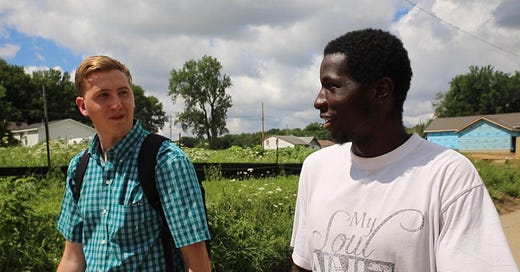




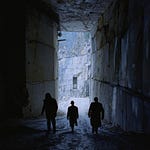
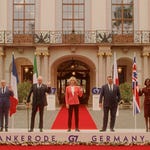
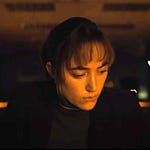
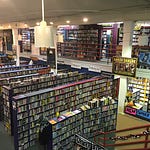
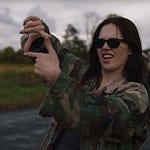
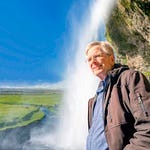

Share this post